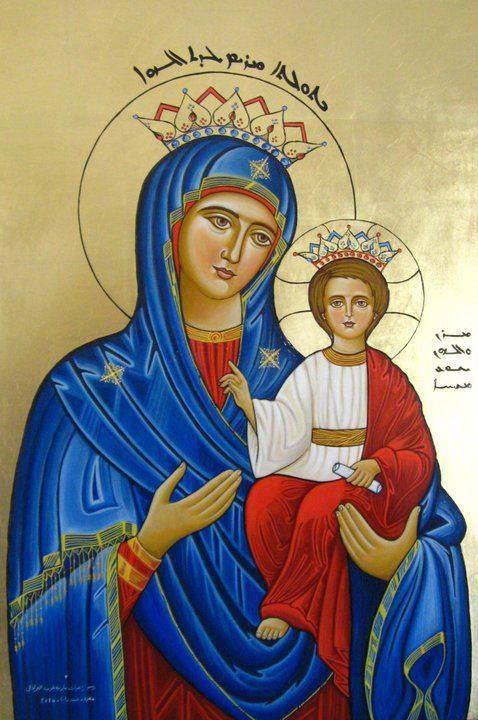 The month of May is traditionally known on as the Month of Mary. The Church holds Mary in the highest esteem; she is venerated but not worshipped by Catholics and Orthodox. A Syrian Father, St Ephrem, –the Harp of the Holy Spirit– the fourth century hymnographer, theologian and deacon as something to offer about the Mother of God.
The month of May is traditionally known on as the Month of Mary. The Church holds Mary in the highest esteem; she is venerated but not worshipped by Catholics and Orthodox. A Syrian Father, St Ephrem, –the Harp of the Holy Spirit– the fourth century hymnographer, theologian and deacon as something to offer about the Mother of God.
“As lightning illuminates what is hidden, so also Christ purifies what is hidden in the nature of things. He purified the Virgin also and then was born, so as to show that where Christ is, there is manifest purity in all its power. He purified the Virgin, having prepared Her by the Holy Spirit… having been born, He left Her virgin. I do not say that Mary became immortal, but that being illuminated by grace, She was not disturbed by sinful desires”
“Most holy Lady, Mother of God, alone most pure in soul and body, alone exceeding all perfection of purity… alone made in thy entirety the home of all the graces of the Most Holy Spirit, and hence exceeding beyond all compare even the angelic virtues in purity and sanctity of soul and body… my Lady most holy, all-pure, all-immaculate, all-stainless, all-undefiled, all-incorrupt, all inviolate spotless robe of Him Who clothes Himself with light as with a garment… flower unfading, purple woven by God, alone most immaculate.”
“There is in you, Lord, no stain, nor any spot in your mother.”
“You Jesus and your mother are the only ones who are beautiful in all aspects. Because in you, O Lord, there is no deformation, and in your mother, there is no stain.”
“The two women were pure and simple, Mary and Eve. One of them, however, became the cause of our death and the other, the cause of our life.”
St. Ephrem the Syrian
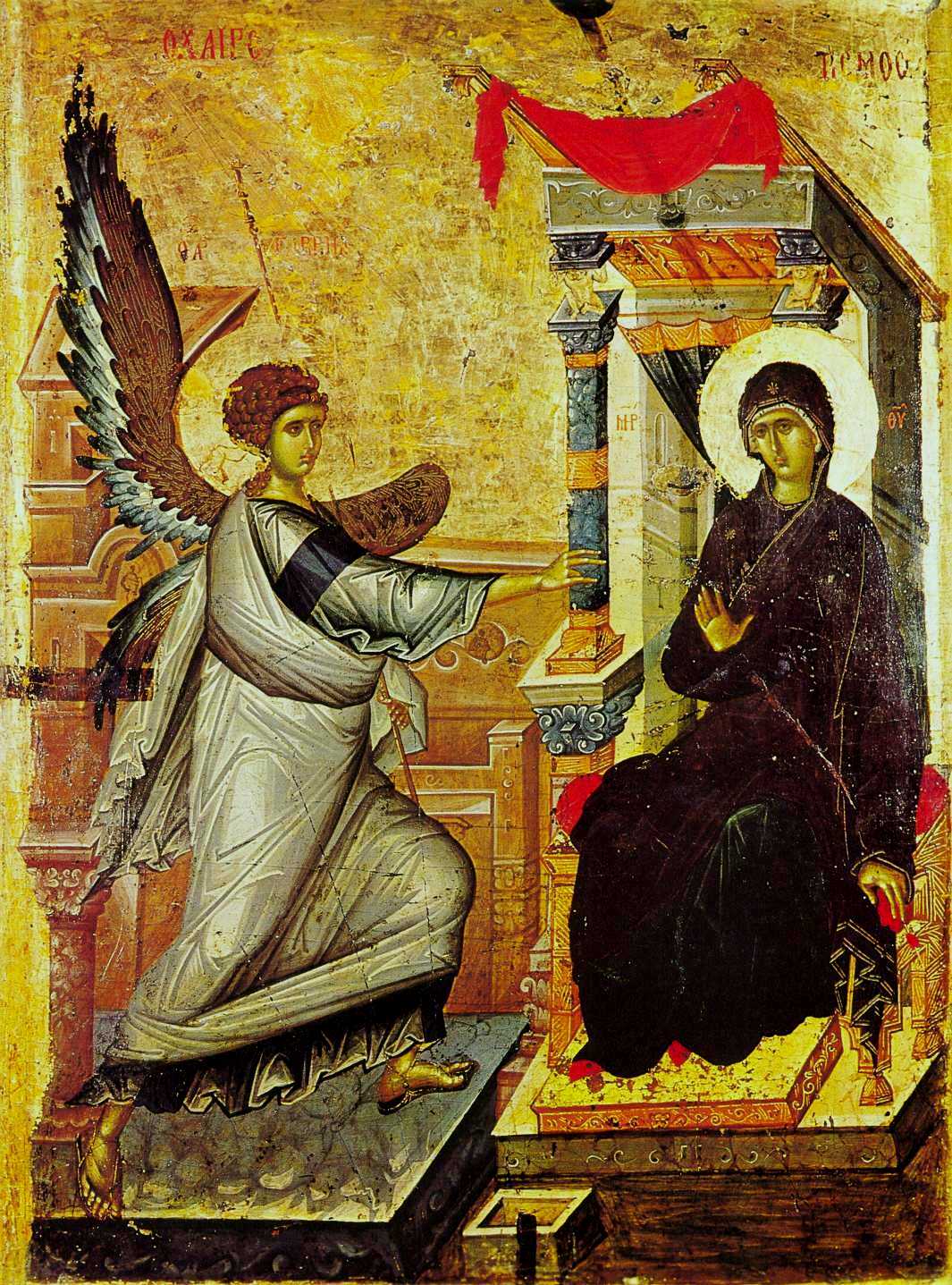 Today the Church celebrates summit of our salvation.
Today the Church celebrates summit of our salvation.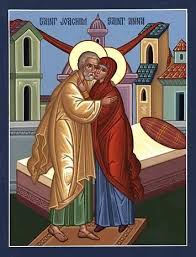 The conception of the all-holy virgin Mary in the womb of Anna is celebrated on December 9 in the Byzantine tradition, for a natural reason, that the Eastern ancients thought a girl was in the womb one day less than a boy. However, in the Ruthenian Church in America [and the Ukrainian Church], the feast is now celebrated together with the Roman Church on December 8, nine months before her birth on September 8, because she is the patron of the United States.
The conception of the all-holy virgin Mary in the womb of Anna is celebrated on December 9 in the Byzantine tradition, for a natural reason, that the Eastern ancients thought a girl was in the womb one day less than a boy. However, in the Ruthenian Church in America [and the Ukrainian Church], the feast is now celebrated together with the Roman Church on December 8, nine months before her birth on September 8, because she is the patron of the United States.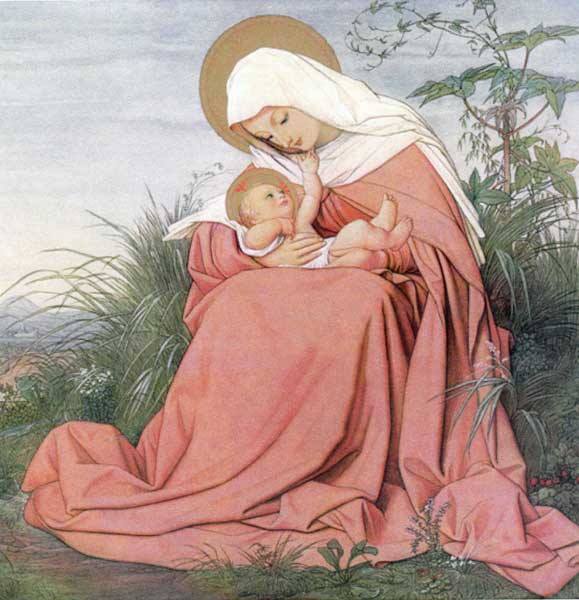 On
On 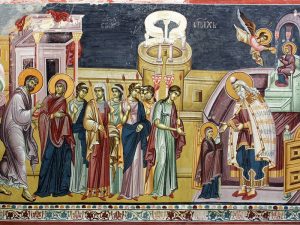 “Seeing the entrance of the pure one, angels marveled in wonder how the Virgin could enter the holy of holies.” (Refrain to Irmos 9, on the feast of the Entrance of the Theotokos into the Temple)
“Seeing the entrance of the pure one, angels marveled in wonder how the Virgin could enter the holy of holies.” (Refrain to Irmos 9, on the feast of the Entrance of the Theotokos into the Temple)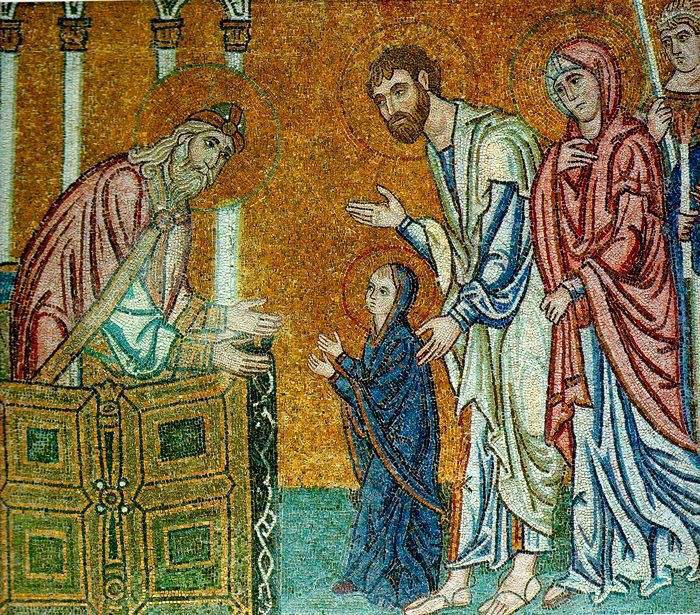 And the child was three years old, and Joachim said: Invite the daughters of the Hebrews that are undefiled, and let them take each a lamp, and let them stand with the lamps burning, that the child may not turn back, and her heart be captivated from the temple of the Lord. And they did so until they went up into the temple of the Lord. And the priest received her, and kissed her, and blessed her, saying: The Lord has magnified your name in all generations. In you, on the last of the days, the Lord will manifest His redemption to the sons of Israel. And he set her down upon the third step of the altar, and the Lord God sent grace upon her; and she danced with her feet, and all the house of Israel loved her. And her parents went down marveling, and praising the Lord God, because the child had not turned back. And Mary was in the temple of the Lord as if she were a dove that dwelt there, and she received food from the hand of an angel.”
And the child was three years old, and Joachim said: Invite the daughters of the Hebrews that are undefiled, and let them take each a lamp, and let them stand with the lamps burning, that the child may not turn back, and her heart be captivated from the temple of the Lord. And they did so until they went up into the temple of the Lord. And the priest received her, and kissed her, and blessed her, saying: The Lord has magnified your name in all generations. In you, on the last of the days, the Lord will manifest His redemption to the sons of Israel. And he set her down upon the third step of the altar, and the Lord God sent grace upon her; and she danced with her feet, and all the house of Israel loved her. And her parents went down marveling, and praising the Lord God, because the child had not turned back. And Mary was in the temple of the Lord as if she were a dove that dwelt there, and she received food from the hand of an angel.”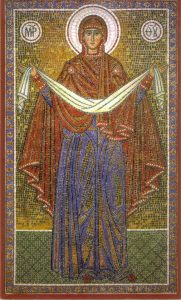 There is only one God, one Creator, one Savior, one Redeemer. Yet this one God has chosen to be friends with his creation. As St. Paul told us, he humbled himself to become a man, like us in every way except sin. There are many ways he could have become a man, but he chose to be born of a woman who in her human nature, accepted completely the will of God, so that through her God could enter into our time and our story. Then, at Cana, it was his mother, a woman, who by her plea, guided God to make wine out of water, telling the stewards, and through them, saying to all of us, “Do whatever he tells you.”
There is only one God, one Creator, one Savior, one Redeemer. Yet this one God has chosen to be friends with his creation. As St. Paul told us, he humbled himself to become a man, like us in every way except sin. There are many ways he could have become a man, but he chose to be born of a woman who in her human nature, accepted completely the will of God, so that through her God could enter into our time and our story. Then, at Cana, it was his mother, a woman, who by her plea, guided God to make wine out of water, telling the stewards, and through them, saying to all of us, “Do whatever he tells you.”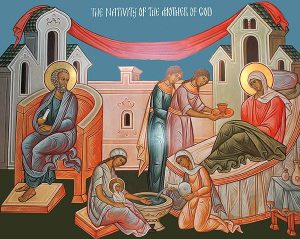 THE REPROACH OF CHILDLESSNESS
THE REPROACH OF CHILDLESSNESS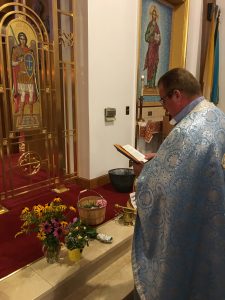 Blessing of Herbs and Flowers on the Feast of the Dormition of the Mother of God –August 15
Blessing of Herbs and Flowers on the Feast of the Dormition of the Mother of God –August 15